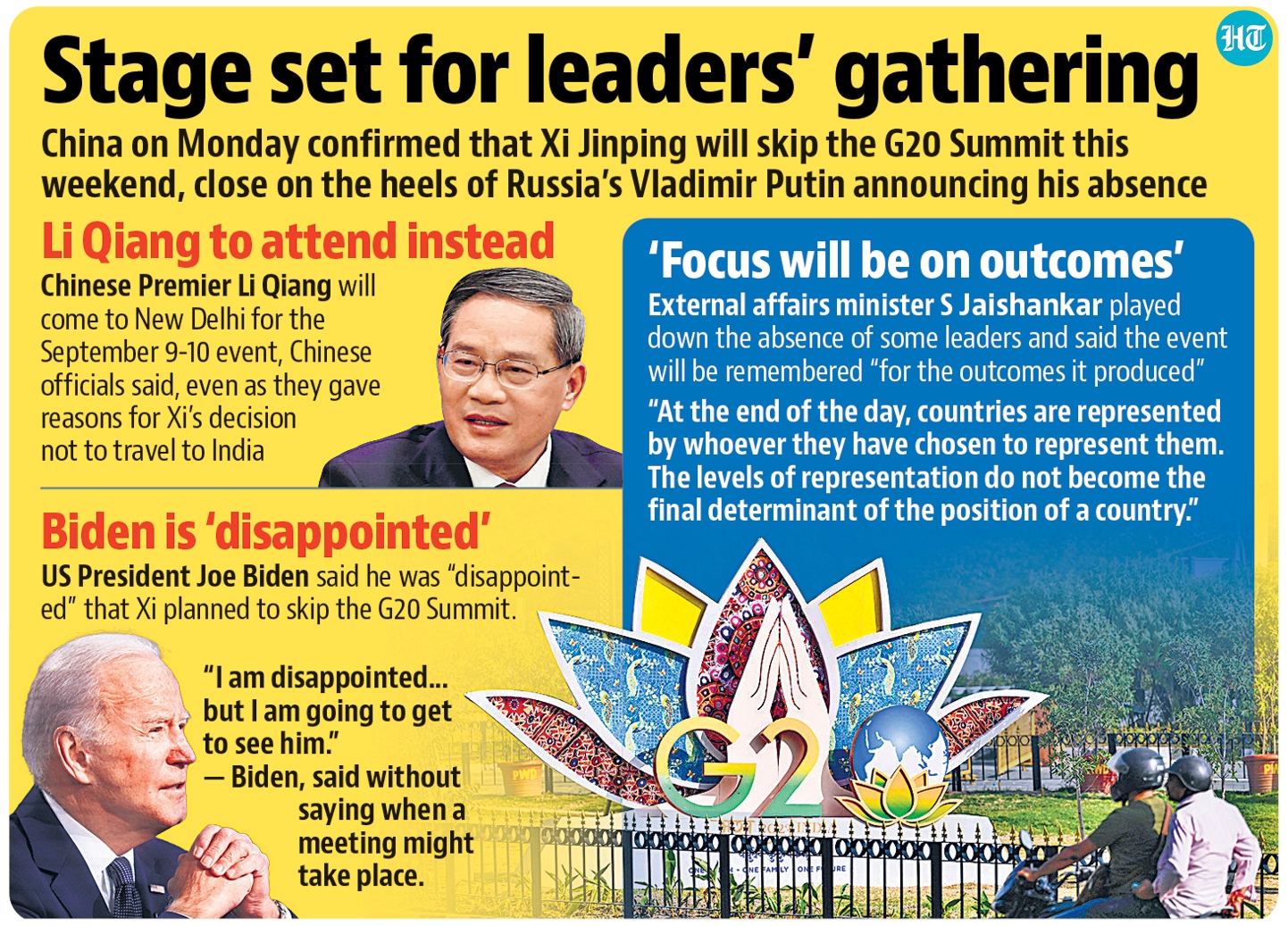Xi to skip Summit amid push for G20 consensus
Chinese President Xi Jinping will skip the G20 Summit hosted by India this weekend, with Premier Li Qiang attending in his place.
China on Monday confirmed President Xi Jinping will skip the G20 Summit to be hosted by India this weekend as speculation swirled in diplomatic circles about whether the grouping of 20 largest economies would overcome differences standing in the way of a joint leaders’ declaration.

Premier Li Qiang will attend the G20 Summit in New Delhi during September 9-10 at the Indian government’s invitation, Chinese foreign ministry spokesperson Mao Ning said without giving reasons for Xi’s decision not to travel to India.
Even before the confirmation from the Chinese side, it had become clear Xi would be the second head of State of a G20 member country – after Russian President Vladimir Putin – to skip the Summit being held against the backdrop of deep divisions over the Ukraine conflict.
External affairs minister S Jaishankar sought to play down the issue of leaders of some G20 states skipping the summit by saying the focus should be on the position taken by countries on “key burning issues of the day”. During a discussion on Doordarshan on Monday, he said: “At the end of the day, countries are represented by whoever they have chosen to represent them. The levels of representation do not become the final determinant of the position of a country.”

Jaishankar said this year’s G20 will be remembered “for the outcomes it produced”, and the focus should be on solutions and actions to tackle the burning issues of the day and the willingness of countries to address such matters.
US President Joe Biden said he was “disappointed” that Xi planned to skip the G20 Summit. “I am disappointed...but I am going to get to see him,” Biden told reporters without saying when a meeting with Xi might take place.
A person aware of the matter later said the two leaders are tentatively expected to meet during the Asia-Pacific Economic Cooperation (Apec) summit in November in California.
Jaishankar acknowledged that the G20 Summit is being held under difficult circumstances, including East-West polarisation and North-South gaps, though everyone would have to wait till September 10 to see the outcomes. He emphasised India’s priorities, including concerns of the Global South, debt predicament of many countries, food and energy prices, and resources for education, nutrition and health.
Asked about China’s expectations from the G20 Summit, foreign ministry spokesperson Mao Ning said the forum for economic cooperation should strengthen partnership and contribute to world economic recovery and global sustainable development.
The sherpas, or senior officials who negotiate on behalf of leaders of G20 states, began their fourth and final meeting at Manesar on Sunday to draft the joint communique or leaders’ declaration. People familiar with the matter said the sherpas will work intensely over four days to overcome differences on a range of issues, not the least of which is the Ukraine crisis. The sherpas will also hold a joint meeting with finance deputies on September 6. This is the first sherpa meeting that is not open to the media, reflecting the sensitivity of the negotiations.
While obvious focus has been on the divergence over the Ukraine crisis – with G7 states insisting on a reference to the conflict in the communique and Russia and China contending the G20 isn’t the forum to discuss geopolitical issues – other contentious issues have emerged in recent weeks, the people said.
The US and its partners have said, at a minimum, the language used to refer to the Ukraine war should be close to the text used in the last G20 leaders’ declaration in Bali, while Russia has said this formulation is no longer acceptable as the ground situation has changed.
China has pushed back on several of India’s signature initiatives, including digital public infrastructure, sustainable development initiatives, women-led development, and even the theme of “Vasudhaiva Kutumbakam” (the world is one family), and the people said much of this opposition appeared linked to the current state of India-China relations, with the two countries locked in a standoff on the Line of Actual Control (LAC).
The Indian side’s proposal for full membership of the African Union (AU) has faced pushback from Australia and Asean members, some of whom made a counterproposal regarding involving the rotating chair of the AU in the G20 process, the people said. Saudi Arabia has expressed reservations on certain climate action and transition initiatives and differences have also emerged on a possible regulatory framework for cryptocurrency, they said.






